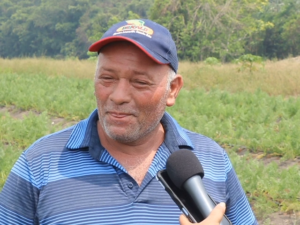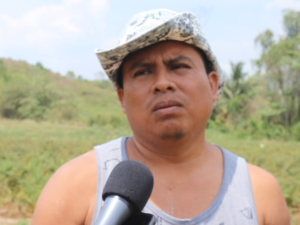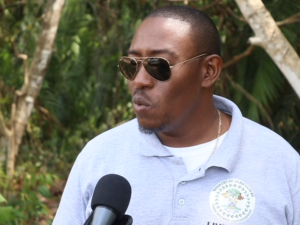Carrot Farmers Demand Crackdown on Contraband Carrots
On Wednesday, carrot farmers in northern Belize voiced their concerns regarding an excess supply of vegetables on the local market. They believe that contrabandistas are part of the reason why they cannot sell their carrots. Out west, carrot farmers share the same belief. But agriculture officials say that the farmers have contributed to the current dilemma. In the following report from News Five’s Marion Ali, the issue is explained in greater detail. Here’s that story.
Marion Ali, Reporting
This carrot farm is part of a sixteen-acre plot that Oscar Martinez planted out last November. But an overabundance of the root vegetable on the market means that he is likely to lose three thousand sacks of carrots. That converts to fifty-five thousand dollars, if he does not find a market for his carrots within the next couple weeks.

Oscar Martinez
Oscar Martinez, Carrot Farmer, La Gracia Village, Cayo
“Last time I sell carrots, the guy buy only four sacks and this time he didn’t get any more because there is too many local and from Mexico.”
Marion Ali
“That’s what he told you?”
Oscar Martinez
“Yeah.”
 Marion Ali
Marion Ali
“Have you tried other people to sell to?”
Oscar Martinez
“Yes, but they don’t want nothing because there is too many from Mexico. Everything is contraband.”
We visited the San Ignacio Town Market and did not see any of the bigger, smoother, contraband carrots available. A vendor told us that they don’t purchase contraband carrots at that market. About thirty miles away in San Antonio Village, Ananias Mesh has seven acres of carrots that remain unharvested. Aside from the contraband issue, the glut of carrots has pushed the price below profitable margins for him.

Ananias Mesh
Ananias Mesh, Carrot Farmer, San Antonio Village, Cayo
“The problem is the price right now is low. We sell $35 by 50 pounds.”
Marion Ali
“What should the price be?”
Ananias Mesh
“At least $50 a 50 pounds. We used to go two times a week in Belize City to sell it. And then right now we are not going right there because it’s too cheap the carrots right deh. Last time we sell like 200 bags a week, but right now we just sell 60 bags a week.”
 Marion Ali
Marion Ali
“And that’s because they’re buying from other people too?”
Ananias Mesh
“Yes. The contraband is affecting us We sell right now slow.”
Marion Ali
 Do you think the contraband is selling for cheaper than you guys?
Do you think the contraband is selling for cheaper than you guys?
Ananias Mesh
“No, expensive.”
Marion Ali
“Why do you think that is? Is it because of the quality? Is there a difference in the quality?”
 Ananias Mesh
Ananias Mesh
“Yes, quality, more quality – the contraband.”
If Mesh doesn’t sell carrots by the end of the crop, he stands to lose twenty thousand dollars. Another contributing factor for the oversupply is climate change. Suitable planting conditions did not occur until late in the year, and that meant that farmers in Cayo who were to provide the first supply of carrots were unable to plant earlier than the other farmers in the north. Now, when these farmers should be reaping the last of their crops, there are still more carrots in the ground than they can sell. That is before the farmers in northern Belize begin to supply the market.
 Oscar Martinez
Oscar Martinez
“The people in charge to stop the contraband, they are supposed to do that. If they don’t do a good job, the contraband never stops. If they don’t stop the contraband, I never plant carrots again.”
In the past two months, Oscar Martinez has only been able to sell roughly two hundred sacks of carrots. He wants the relevant authorities to crack down on those who are contrabanding carrots in Belize. That is a step that Andrew Maheia says will be taken in the days ahead.

Andrew Maheia
Andrew Maheia, Acting Director, Extension Unit, Ministry of Agriculture
“When we do activate and we’re, after this exercise, that’s the first thing we’re going to do: activate the vegetable interdiction unit to ensure that all entities come together and we try to see what’s the source of the problem.”

But Maheia says that the carrot farmers also bear some responsibility for the problems they are facing now with oversupply. They don’t plant in phases, and they plant more than they agree to plant.
Andrew Maheia
“The farmers did one thing that wasn’t planned – the production acreages, they planted more and compounded to the issue of them planting together. The Ministry of Agriculture can only do so much. We meet with the farmers on a regular basis. We plan who will plant first. The schedule will ensure that the farmers understand and most of them don’t abide by it. They will tell us, “okay, I’ll plant two acres this year. I normally plant two, I’ll stick to two.” The extension officers visit the farm, it’s three, it’s four, it’s five acres.”
 Marion Ali
Marion Ali
“And everybody together?”
Andrew Maheia
“And that’s the thing. Once the climatic conditions remain the same as last year, they will plant together. And then we’ll be right back again here next year. We’re hoping that we have better coordination, better communication with the farmers this year.”
Marion Ali for News Five.






Facebook Comments